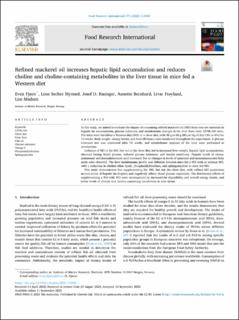| dc.contributor.author | Fjære, Even | |
| dc.contributor.author | Myrmel, Lene Secher | |
| dc.contributor.author | Rasinger, Josef | |
| dc.contributor.author | Bernhard, Annette | |
| dc.contributor.author | Frøyland, Livar | |
| dc.contributor.author | Madsen, Lise | |
| dc.date.accessioned | 2023-10-06T12:00:14Z | |
| dc.date.available | 2023-10-06T12:00:14Z | |
| dc.date.created | 2023-09-23T18:11:37Z | |
| dc.date.issued | 2023 | |
| dc.identifier.citation | Food Research International. 2023, 173 (part 2), . | en_US |
| dc.identifier.issn | 0963-9969 | |
| dc.identifier.uri | https://hdl.handle.net/11250/3094968 | |
| dc.description.abstract | In this study, we aimed to evaluate the impact of consuming refined mackerel oil (MO) from rest raw material on hepatic fat accumulation, glucose tolerance, and metabolomic changes in the liver from male C57BL/6N mice. The mice were fed either a Western diet (WD) or a chow diet, with 30 g or 60 g MO per kg of diet (3% or 6%) for 13 weeks. Body weight, energy intake, and feed efficiency were monitored throughout the experiment. A glucose tolerance test was conducted after 11 weeks, and metabolomic analyses of the liver were performed at termination. | en_US |
| dc.language.iso | eng | en_US |
| dc.title | Refined mackerel oil increases hepatic lipid accumulation and reduces choline and choline-containing metabolites in the liver tissue in mice fed a Western diet | en_US |
| dc.title.alternative | Refined mackerel oil increases hepatic lipid accumulation and reduces choline and choline-containing metabolites in the liver tissue in mice fed a Western diet | en_US |
| dc.type | Peer reviewed | en_US |
| dc.type | Journal article | en_US |
| dc.description.version | publishedVersion | en_US |
| dc.source.pagenumber | 9 | en_US |
| dc.source.volume | 173 | en_US |
| dc.source.journal | Food Research International | en_US |
| dc.source.issue | part 2 | en_US |
| dc.identifier.doi | 10.1016/j.foodres.2023.113450 | |
| dc.identifier.cristin | 2178243 | |
| cristin.ispublished | true | |
| cristin.fulltext | original | |
| cristin.qualitycode | 1 | |
